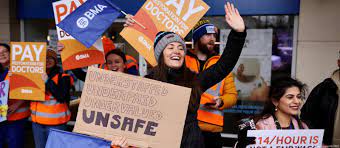Tuesday marked the beginning of a four-day strike by tens of thousands of physicians throughout England, which is being hailed as the most disruptive in the history of the country’s public health system.
The National Health Service’s hospital and clinic treatment depends heavily on junior doctors, whose strike is scheduled to extend until Saturday morning at 7 a.m.
About half of all doctors in the NHS are junior doctors or those who are just beginning their careers. Bosses in the health sector estimate that up to 350,000 appointments and surgeries will be postponed or canceled during the walkout. In order to cover emergency services, critical care, and maternity services, senior doctors and other medical professionals had to be called in.
The walkout “is going to be the most disruptive period of strike action that we’ve seen this winter, certainly the most disruptive period of action in NHS history,” according to Stephen Powis, medical director of NHS England.
The physicians’ trade union, the British Medical Association, is asking for a 35% wage hike to make up for years of increases that have lagged behind inflation. The U.K. minimum wage is a little over 10 pounds per hour, according to the union, but pay for newly trained doctors grows quickly after the first year.
The protest may be put to an end, according to Dr. Vivek Trivedi, co-chair of the union’s junior physicians committee, if Health Secretary Steve Barclay made a “serious offer” on salary. Although claiming that the 35% demand is expensive, the government says it is open to discussions if the strike is called off.
As workers have been demanding salary increases to keep up with soaring inflation, which stood at 10.4% in February, a wave of strikes has interrupted British citizens’ lives for months.
In order to seek a raise in wages, nurses, ambulance crews, teachers, border agents, driving examiners, bus drivers, and postal workers have all called in sick.
According to unions, earnings have decreased in real terms over the past ten years, particularly in the public sector, and many people are finding it difficult to make ends meet due to a cost-of-living crisis brought on by drastically rising food and energy prices.

















